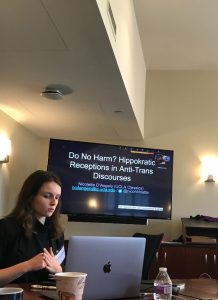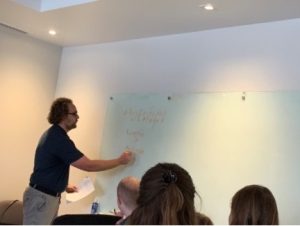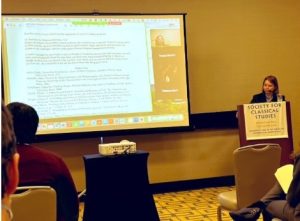Graduate students in the Department of Classics had a very busy year, traveling to near and far to present their research papers. Here are each of the students’ details on the papers they presented in the 2022-23 academic year.
Mary Anastasi
CS 2023 (New Orleans)
Title: Epistolarity and Monumentality in the Letters of Diogenes of Oenoanda
Location: New Orleans (I presented remotely, though!)
Date: January 8, 2023
Conference: Society for Classical Studies 2023 Annual Meeting
In this paper, I discussed the letters of one Diogenes of Oenoanda, an Imperial-era Epicurean and civic benefactor who constructed a large public stoa inscribed with Epicurean texts, maxims, and letters to teach visitors about Epicurean philosophy. Diogenes employs the letters’ literally-monumental medium in order to highlight the metaphorical monumentality of his work, entwining his personal legacy with the legacy of Epicureanism. In addition, the letters create a sort of virtual Epicurean community that implicates the visitors of the stoa, who are encouraged to adopt the persona of the historical addressee when they read the inscription.
USC Classics Graduate Colloquium on Fragments (Los Angeles)
Title: Time, Nostalgia, and Asynchronous Desire in the Letters of Fronto and Marcus Aurelius
Location: USC campus, Los Angeles
Date: April 15, 2023
Conference: USC Classics Graduate Colloquium (conference topic = fragments)
As starting-point for this paper on nostalgia and epistolary time in Fronto’s letters, I used one particularly compelling fragment preserved only in Charisius: Male me, Marce, praeteritae vitae paenitet. The fragment might seem fairly unremarkable, but it takes on new meaning when considered in juxtaposition with the larger whole of the Frontonian corpus. Fronto often reflects on the past, a tendency that is connected to his depth of feeling for Marcus. The USC Classics community was very welcoming, and Professor Culik-Baird gave a wonderful keynote.

Photo courtesy of Nicolette D’Angelo
Nicolette D’Angelo
Title: “Queer failures of form in the Hippokratic case history of Phaethousa and Nanno”
Location: New Orleans
Date: January 6th, 2023
Event: SCS/AIA 2023, in the panel “The Content of the Form(s): Confronting Genre Myopia in Ancient Greek Texts”
I presented at this year’s annual SCS/AIA meeting (my first in-person!) in a co-organized panel called “The Content of the Form(s): Confronting Genre Myopia in Ancient Greek Texts.” My contribution was a paper called “Queer failures of form in the Hippokratic case history of Phaethousa and Nanno,” and it explored the reception history of a case history reported in the Epidemics of two non-normatively gendered patients who die at the hands of physicians’ feminizing interventions. The talk applied insights and methodologies from trans studies to analyze overlooked aspects of the case, and also argued for scholars of ancient medicine to embrace these methodologies in order to counter anti-transness in our sources as well as at the field level. I am excited to be continuing this work as a GSRM with Ella Haselswerdt this summer.
Title: “Do No Harm? Anti-Trans Receptions in Hippokratic Discourses”
Location: Princeton University
Date: March 5th, 2023
Event: Princeton Workshop on Ancient Greco-Roman Medicine & Biology
I was extremely grateful to present a work-in-progress to a captive audience of classicists and philosophers at Princeton in March! My paper explored how “do no harm,” the Hippokratic injunction against medical malpractice and overtreatment, solidified itself as a rallying cry within anti-trans online discourses in 2022. For about two years, I had been documenting the appropriation of Hippokratic ideas within these discourses using Twitter, which allowed me to foray into some digital humanities approaches. Pulling on themes observed across my tweet database, I put Hippokratic ethics in conversation with “harm” as an operative vector of social panic in discourses surrounding trans and gender non-conforming children. My goal in doing so was not to recuperate ancient medical ideas or ‘debunk’ anti-trans receptions, but rather expose how ancient models of harm have become constitutive of transphobic ideologies.
Benjamin Davis
Title: Snuffing the Fire: Contextualizing the Temple of Vesta in the Late Antique Roman Forum
Location: Provo, Utah (hosted by the Utah Classical Association)
Date: April 1, 2023
Conference: Classical Association of the Middle West and South (CAMWS)
My paper, presented on CAMWS’s Late Antiquity panel, studies the changing associations of the Temple of Vesta (Aedes Vestae) in the Roman Forum in the late 4th century CE and argues that the temple became a particular locus of controversy in the decades immediately preceding its closure. In the paper, I link developments in the built environment of the Vestal complex and its surroundings in the 4th century to literary evidence of Christian superstitions about the site, including a legend in the anonymous Actus Silvestri about a demonic dragon dwelling beneath the temple. The project originated in Chris Johanson’s Roman Forum seminar and developed through further digital humanities research undertaken with Dr. Johanson in Summer 2022, supported by a Diebold Award as part of a three-part collaborative study of the Vestal complex alongside parallel projects by Patrick Callahan and Collin Moat. The talk was a great success, and as a native of the Salt Lake City area I was especially delighted to present my research at a venue in my home state and to reconnect with professors and old friends from the University of Utah where I completed my B.A. in 2016.

Photo courtesy of Tom Francis
Tom Francis
A Semantic Reappraisal of Umbrian *-nky– Perfects
Location: Provo, Utah
Date: March 20, 2023
Event: CAMWS
Italic Funky Facts and Nitty Gritty: A Semantic Reappraisal of Umbrian *-nky– Perfects and Oscan –tt– Perfects
Location: UCLA
Date: June 1, 2023
Event: UCLA Classics MA Paper Talks
My MA Paper research focused on the historical background of two Italic perfect forms: the Umbrian *-nky– and Oscan –tt– perfect forms. Recent scholarship (see esp. Dupraz 2016, Willi 2010, Willi 2016) has been divided on their respective historical backgrounds. In my paper, I employed semantic analyses and a study of comparative data from Latin to provide a new analysis of the two forms. My research supported Willi’s proposal for the historical background of Umbrian *-nky– perfects but suggested that the most recent proposals for Oscan –tt– perfects have some difficulties and that further research is still required for the Oscan data.

Photo courtesy of Collin Moat
Collin Moat
In March, I was invited back to my alma mater St. Olaf College to participate in a retirement conference in honor of Steve Reece (also a graduate of UCLA Classics!). To celebrate his scholarship and transition to retired life, I presented on the significance of thresholds in the Odyssey. Using Steve’s first book on Homeric hospitality scenes as a foundation, I argued that the marked treatment of an important element of these hospitality scenes— the “Waiting at the Threshold” motif—in the Phaeacian hospitality scene gives the audience insight into Odysseus’ traumatic past and the poem’s narratological future. The threshold serves not only as a liminal space through which the hero must literally and symbolically pass but also as a dynamic vantage for observing the complexity of the epic poem.
In June, I presented at the Society for Ancient Mediterranean Religion’s conference GODSCAPES: Ritual, Belief and the Natural World in the Ancient Mediterranean and Beyond, hosted by the University of St. Andrews. My paper focused the description of the Idaean nymphs in the Hymn to Aphrodite (256–75), the most detailed passage about nymphs from the Archaic period, and analyzes their vital connection to their tree counterparts in light of the poem’s larger themes and Iliadic tree similes. Ultimately, I demonstrated that in the vivid description of tree death at the end of the passage, the trees act as non-anthropomorphic, extended bodies of the nymphs, allowing the audience to witness what would otherwise be impossible with an anthropomorphic figure: a sensuous death befitting the erotic lives of nymphs.

Photo courtesy of Rachel Morrison
Rachel Morrison
At this year’s annual Society for Classical Studies meeting in New Orleans, I presented a paper entitled “ubique praesentem mihi: Long-Distance Amicitia and Physical Presence in the Letters of Paulinus of Nola.” In a world that did not yet have Zoom, Paulinus is preoccupied by what it means to be long-distance friends. In his letters to his former teacher Ausonius, he downplays the importance of physical togetherness and eventual reunion, responding to a request for one last visit with a reassurance that the pair’s spirits are entwined, so they are already together in the way that matters most. With his friend Sulpicius Severus, however, Paulinus craves physical togetherness in the here and now, urging his friend, “Come to me and if you can, hurry” (veni ad nos et si potes, advola). From these two case studies, I argue, we can see how theories of amicitia break down in the face of the particularity of individual relationships.
Marco Saldana
At this year’s annual CAMWS meeting held in Provo, UT, I presented a paper entitle “In or Out?: Political Blame in Alcaeus.” This paper examines the use of the words δᾶμος, ‘the people,’ in fragments 70 and 129 and πολίται, ‘citizens,’ in fragment 130, the only fragments in which these two words appear. I argue that Alcaeus crafted the Lesbian δᾶμος as the victim of tyrannical turmoil while the πολίται are framed as bad actors, despite both words referring to the same political body. Furthermore, following Jessica Romney’s work on group identity and archaic poetry (2018, 2020), I argue that Alcaeus uses δᾶμος to integrate the Lesbian people into his own ‘in-group,’ i.e. his hetaireia/political faction, while pushing the πολίται into his ‘out-group,’ or Pittacus’ faction.

